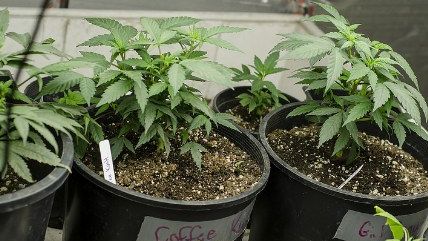Marijuana: From Societal Scourge to Small Town Salvation?
This California city wants to change its reputation from prison community to legal pot manufacturer.


Adelanto is a small town (population: 31.000) in the deserts of inland Southern California where they send people to prison. That's what it's known for—though for residents of the Inland Empire, it's also known for being worse-off than all the other towns in the area. (During my time living in nearby Barstow, this became a reoccurring joke for us at the newspaper, as Adelanto was always just below Barstow as being worse off in every single economic, crime, and demographic indicator. "At least we're not Adelanto," was the refrain.)
It's a fairly poor community, with a median household wage of $37,000, much lower than the state median of $60,000.
These desert communities were also hit very, very hard by the housing collapse. Home construction boomed in these places, fed by a bubble that put people in freshly built houses they really couldn't afford. After the bubble burst, it was just about ground zero for the worst parade of foreclosures, nearly turning blocks into ghost towns.
But when California citizens voted to loosen marijuana laws and allow for medical use, most of these communities resisted and passed ordinances to prohibit pot dispensaries in their neighborhoods. Blame it on the culture of the drug war: Citizens of these desert communities sometimes directly experience the effects of drug addiction by people that they actually know and end up concluding that the problem is that we're not fighting hard enough. The economic arguments in favor of allowing for sale of marijuana held little sway. Too many people thought it was just bad news.
Now, call it desperation or an enterprising spirit: Adelanto is embracing the future of marijuana legalization. What these desert towns have to offer is lots of geography, and Adelanto has decided to open it up for legal, commercial marijuana cultivation. Adelanto, which once flirted with bankruptcy, is now seeing a land rush and people willing to spend millions to secure property and permits to grow marijuana legally, considering a future where millions of Californians will legally be permitted to enjoy weed recreationally.
Steven Greenhut briefly mentioned Adelanto recently when he wrote about the complex politics and legal issues when drafting and implementing marijuana regulations in California. Brooke Edward Staggs of the Orange County Register trekked over to Adelanto to see what the town was hoping for. It's only the second city in Southern California to permit commercial marijuana growing and they're predicting that being ahead of the curve will pay off:
Joseph Brady, president of the commercial real estate firm the Bradco Companies, said that before Adelanto voted to allow cultivation he'd get one call a week with people interested in buying land or buildings. Since the September vote, he's been averaging five calls a day.
"I've had a broker's license since March 1980," Brady said. "I have never in my life seen anything like this happen."
One plot was valued at $1.5 million before the zoning changed to allow cultivation, he said; now it's in escrow for $4 million.
[Elizabeth] Brown, who's with Lee & Associates, said land that was going for 50 to 90 cents per square foot is now going for $12 to $14.
But is this going to be a boom or another bubble? That is the question. Edwards Staggs doesn't talk about the housing bubble, but she does mention another bubble that followed out in the California desert. For a couple of years, solar energy plants were going to save everybody from the recession. Bolstered by money potentially available from the federal economic stimulus, dozens of solar projects were proposed for the desert last decade. In reality, most of those proposals went nowhere and nothing happened. Only a small fraction of those projects ever came to fruition, and people discovered that solar plants actually were not big job generators.
In this case, given the lack of competition, the city has to figure out how much it wants to milk from growers for its own coffers. The reporter notes that a tax plan similar to nearby Desert Hot Springs (the other town to permit cultivation) could net Adelanto $6 million per year if all goes well, equal to nearly half of the city's entire annual budget. But they're discussing having even higher rates to try to get even more money. The big unknown is whether other cities might change their minds and decide to allow pot growers in, something that is bound to happen if Adelanto succeeds and sloughs off its reputation as the poorest small town in the High Desert. So they have to consider in advance what other towns might potentially do and what incentives they might create to draw away this new industry.
In the meantime, it's nevertheless interesting to note that a town that once focused on its role in America's obsession with incarceration may find its economic survival in the winding down of the drug war. (And as an interesting touch, it could end up driving out the local representation from General Atomics Aeronautics Systems, the manufacturers of the Predator drone, because their landlords can get more money from the marijuana growers.)


Show Comments (23)